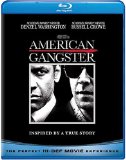| Reviews & Columns |
|
Reviews DVD TV on DVD Blu-ray 4K UHD International DVDs In Theaters Reviews by Studio Video Games Features Collector Series DVDs Easter Egg Database Interviews DVD Talk Radio Feature Articles Columns Anime Talk DVD Savant Horror DVDs The M.O.D. Squad Art House HD Talk Silent DVD
|
DVD Talk Forum |
|
|
| Resources |
|
DVD Price Search Customer Service #'s RCE Info Links |
|
Columns
|
|
|
American Gangster
Universal // R // October 14, 2008
List Price: $29.98 [Buy now and save at Amazon]
Frank Lucas (Denzel Washington) and Richie Roberts (Russell Crowe) are two sides of the same coin, both caught on opposite sides of the drug war that threatened to consume Harlem in the early 1970s. Despite one being a cop and the other responsible for 85% of the heroin moving into the tri-state area, they're not as different as they'd probably like to believe.
Both men hide their
hypocrisy behind a false veneer of integrity. Detective Roberts turns in nearly a million dollars in unmarked bills that he and his drug-addled partner stumble upon, earning him nothing but mistrust and contempt by a department entrenched in corruption. Roberts is unwaveringly honest as a cop, sure, but he'll screw anything on two legs, and he's all but abandoned his son, only putting up a token struggle for custody to give his ex-wife (Carla Gugino) a headache.
Frank Lucas, meanwhile, is a devoted family man. He dotes over his wife (Lymari Nadal), has helped relocate his entire family from the boondocks of North Carolina all the way to the Big Apple, and without fail takes his mother (Ruby Dee) to church every Sunday. Lucas takes pride in Harlem and does his best to give back to the community that's been so generous to him. At the same time, of course, he's the merchant of death responsible for untold thousands of junkies in his neighborhood overdosing, capitalizing on their misery to the tune of a million dollars a day.
Both Lucas and Roberts refuse to do business as usual. Roberts shrugs off the graft that had become standard practice in the big city, and after his honesty alienates him from the rest of the department, he's given a shot at launching his own narcotics investigation force. They don't fret about dimebags or dealers on the corner; as the city becomes addicted to the purest form of heroin it's ever seen, Lucas is hellbent on cutting the supply chain off at its source, but it's not coming from any of the usual suspects.
The mob has shilled watered-down heroin for years -- frequently nicked by corrupt cops, cut-down, and resold back to them -- but Lucas doesn't want to just be a dependent middle-man like his mentor, the late Bumpy Johnson (Clarence Williams III). He goes instead directly to the source, spending months establishing connections in the jungles of Thailand and using the military infrastructure of the Vietnam War to shuttle thousands of kilos of pure, uncut heroin back to these shores. Lucas' "Blue Magic" is three times more potent than the rest of the heroin on the streets and goes for half the price. An overnight multimillionaire, Lucas is careful to keep his criminal ties under wraps, not that investigators in this divisive era would believe that a black man could dominate the established order anyway.
American Gangster in a quite a lot of ways feels like a pair of movies woven into one. For much of the film, neither man has any idea the other exists, and they don't meet until its final moments. That's kind of an intriguing concept, stepping away from the familiar cat-and-mouse formula, although it's not surprising that this approach does sap away some of the tension. For a movie with "gangster" in the title, it isn't exactly steeped in action either. There are a handful of gunshots leading up to the climax of American Gangster, but there isn't a moment that could justifiably be labeled as "action" until the close of the
third act: a brutal but brief raid that doesn't take place until the final twenty minutes of this nearly three hour long version of the movie. The finale limps on disinterestedly after that, unfortunately, and even the inevitable meeting between Lucas and Roberts fails to crackle with any real intensity.
The movie is wonderfully cast and well-acted -- more than enough to wipe away the memory of Virtuosity, Crowe and Washington's last on-screen pairing as cop and killer -- but even though American Gangster does take pains to give both men an even keel, it still feels lopsided. I just didn't feel particularly engaged by the character of Richie Roberts. It's a lower-key performance that leans away from Crowe's usual intensity, and there's rarely any sign that Roberts is anything but hopelessly outmatched and outclassed by Lucas.
American Gangster is anchored by a compelling, if largely internalized, turn by Denzel Washington, drawing Frank Lucas as a man whose every action and mannerism is carefully and deliberately considered. Lucas keeps himself under the radar by avoiding being flashy or drawing unwanted attention to himself, and this is reflected in Washington's fairly subdued performance. His charm, charisma, and even a sort of nobility make it easy to forget that Lucas is responsible for the deaths of thousands, something American Gangster tries to address by intercutting graphic imagery of the misery he's wrought, and the quietness of his performance makes Lucas' anger seem that much more explosive when he does let loose.
2007 was a hell of a year for Josh Brolin, having carried much of No Country for Old Men on his shoulders and standing out as the most memorable thing about In the Valley of Elah, Grindhouse, and American Gangster. His turn as an untouchably corrupt cop here isn't exactly subtle, but it's an unflinching, untethered performance and easily my favorite in the movie.
Lucas and Roberts are kept at such a distance from the audience and each other that I wouldn't consider American Gangster to be a character piece any more than I would an action movie, and even having watched it several times by this point, there really isn't anything -- in terms of the characters, the story, or Ridley Scott's visual style -- for me to sink my teeth into. I have to admit that this leaves me feeling almost indifferent towards American Gangster. The movie consistently held my attention and doesn't make any gross missteps, but written, directed, and acted with perhaps too much restraint, it lacks the certain, indefinable something that'd make for a particularly engaging, memorable film. I do like American Gangster -- a well-acted slow burn through a familiar, reliable premise -- but I can't muster quite enough enthusiasm to say that it's an essential purchase.
This Blu-ray release includes both the
theatrical version of American Gangster as well as the nearly three hour long extended cut. Aside from an unnecessarily extended epilogue, the differences between the two are fairly marginal.
Video: When American Gangster was released on HD DVD, it too included both versions of the movie, but bafflingly, only the theatrical cut was presented in high definition. Universal has corrected that misstep on Blu-ray via seamless branching, allowing both versions of the film to be offered in 1080p.
Ridley Scott speaks at length in the disc's audio commentary about the very distinctive look he wanted to shape for American Gangster, and while it does look as if this Blu-ray disc maintains that intent, it's not a visual style that exactly dazzles in high definition. Clarity and fine detail impress somewhat in tighter shots, but the image is unusually soft and murky when the camera eases back. Much of the color has been drained away, leaving a palette that's gray, desaturated, and overcast. The flattened contrast and anemic black levels just result in the movie looking that much more limp and lifeless. Somewhat unexpectedly for a movie taking so many of its visual cues from the grim, gritty movies of the '70s, there's surprisingly little visible film grain, and I can't help but be suspicious that Universal's wiped away some of that texture as they have for several of their other recent Blu-ray releases. I'm sure American Gangster is at least a modest step up over the DVD, but I'm skeptical that it'd make for a particularly compelling upgrade, and viewers shouldn't go in expecting anything approaching reference quality.
American Gangster is lightly letterboxed to preserve its theatrical aspect ratio of 1.85:1, and both versions of the film have been compressed with the VC-1 codec.
Audio: Both versions of American Gangster boast an outstanding 24-bit DTS-HD Master Audio soundtrack. Even with little in the way of the usual action theatrics, the sound design uses all of the channels at its fingertips to render a rich, immersive atmosphere, from the hustle and bustle of the Big Apple to some smooth split surround effects as a helicopter soars overhead. The Frazier/Ali fight -- a key sequence in the film -- takes advantage as well, thanks to the deafening roar of the crowd and the relentless flashing of camera bulbs. The highlight, of course, is the climactic raid on Lucas' stronghold, which is brief but unflinchingly, devastatingly brutal and leaves a hell of an impression. The film's dialogue is rendered cleanly and clearly, although there were a few scattered spots where it seemed a touch low in the mix. The lower frequencies tend to be fairly restrained, but the cracks of gunfire and the rattling trains are bolstered by a decent amount of bass. While I'll admit to being underwhelmed by American Gangster's visuals in high definition, its lossless audio impresses by any reasonable standard.
The theatrical cut of American Gangster also includes a French track in Dolby Digital 5.1, although there are no dubs for the extended version of the movie. Both cuts of the film are accompanied by optional subtitle streams in English (SDH), French, and Spanish.
Extras: Exclusive to this Blu-ray release is another of Universal's U-Control features: this time, picture-in-picture video overlaying brief interviews and behind-the-scenes footage over the extended cut of the movie as it plays. This fly-on-the-wall footage from the shoot appears in quick, sparse spurts, though, and it's too infrequent to
stand out as especially compelling.
The theatrical version of American Gangster offers audio commentary by Ridley Scott and writer Steven Zaillian. The two of them were recorded separately and pieced together for this track, and the editing does ensure that there aren't any awkward gaps of silence throughout the movie's two and a half hour runtime. I'll admit that the commentary seemed awfully dry to me at first, but I eventually warmed to it, particularly when Scott started speaking more at length about the technical end of filmmaking. Scott is very much the dominant presence in this track, and some of the highlights include his descriptions of the logistics of managing a period piece on this sort of enormous scale, distinguishing between a "movie" and a "film", describing at length what he sought out to accomplish with the film visually, comparing and contrasting modern filmmaking technology and techniques with his earliest days as a director, and even ranting about the quality of first-rate cigars versus coffee and tea.
Zaillian naturally focuses more on his process as a screenwriter, including the evolution of many different drafts, the daunting density of a screenplay with 350 scenes, and how he pared down some 50 hours of interviews and tomes of research into a coherent script. The commentary also offers additional background into the real life events, such as further detailing exactly how Lucas established his heroin pipeline and how it was prepared for distribution as well as Roberts' all-but-non-existent reward for bringing such a notorious criminal to justice. The commentary is a bit of a slow burn at first, but it's worth a listen.
The centerpiece of the disc's extras is the feature-length "Fallen Empire: Making American Gangster" (78 min.), which can be viewed in its entirety or as six individual featurettes. "Fallen Empire" opens by delving in-depth into the real-life story that inspired American Gangster, continuing from there into the scale of the costume design and the influence the wardrobe had on the cast, the troubled history behind a project that twice before had the plug pulled on it, location scouting, casting celebrity cameos and filling an arena with some 1,500 inflatable extras for the Ali/Frazier bout, and the extensive work that went into the editing, sound design, and music of the film. Comprehensive and engaging, "Fallen Empire" is my favorite of the extras on this disc.
"Case Files" is a 25 minute set of
fly-on-the-wall footage, with only one bit of clowning around by Russell Crowe breaking the fourth wall. Two of the three segments are set during pre-production: the first during a conference call between Ridley Scott, Steven Zaillian, and the real-life Richie Roberts as the script was receiving its final polish, and the second follows Scott as he, a propmaster, and a narcotics investigator explore the most cinematic way to convey the purity of Lucas' heroin. The only segment set against the backdrop of the actual shoot is the choreography and direction behind the climactic takedown, delving in great detail into American Gangster's most intense action-oriented sequence.
Most of the other extras are fairly bland, though. Two heavily promotional pieces -- one a bit of shameless corporate synergy from Dateline NBC, the other courtesy of BET -- mix a bit of backstory, lightweight interviews, and many clips from the movie. The BET special is the better of the two, featuring a more extensive selection of talent and touching on the film's soundtrack as well. These two promotional pieces clock in around 20 minutes each. The other featurette, "Hip Hop Infusion" (5 min.), highlights the number of rappers acting in American Gangster and notes that those sorts of performers tend to be at ease improvising in front of the camera.
There are two deleted scenes, including a very brief bit of gunplay that would've opened the movie as well as an unnecessary and rather uninteresting peek inside Lucas' wedding. These two short pieces of footage run right at four minutes in total. Rounding out the extras are two music videos -- a remix of Anthony Hamilton's "Do You Feel Me?" (f. Ghostface Killer) and Jay-Z's "Blue Magic" -- along with a theatrical trailer. None of the extras on this disc are presented in high definition.
Conclusion: With American Gangster, Ridley Scott aims for the dizzying heights of The Godfather but misfires. I like the movie, but its detached, subdued approach and determination to keep its central characters at arm's length from both each other and the audience feel like a missed opportunity. The film's deliberately low-key visual style doesn't impress in high definition either, although this Blu-ray disc does feature an excellent lossless soundtrack and a reasonably extensive set of extras. Recommended, but with reservations; American Gangster is worth seeing but falls considerably short of the expectations swirling around it.
Both men hide their
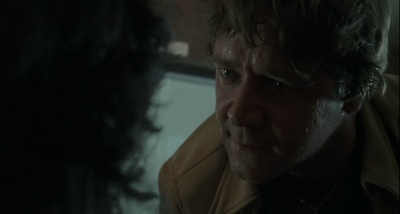 |
| [click on the thumbnail to enlarge] |
Frank Lucas, meanwhile, is a devoted family man. He dotes over his wife (Lymari Nadal), has helped relocate his entire family from the boondocks of North Carolina all the way to the Big Apple, and without fail takes his mother (Ruby Dee) to church every Sunday. Lucas takes pride in Harlem and does his best to give back to the community that's been so generous to him. At the same time, of course, he's the merchant of death responsible for untold thousands of junkies in his neighborhood overdosing, capitalizing on their misery to the tune of a million dollars a day.
Both Lucas and Roberts refuse to do business as usual. Roberts shrugs off the graft that had become standard practice in the big city, and after his honesty alienates him from the rest of the department, he's given a shot at launching his own narcotics investigation force. They don't fret about dimebags or dealers on the corner; as the city becomes addicted to the purest form of heroin it's ever seen, Lucas is hellbent on cutting the supply chain off at its source, but it's not coming from any of the usual suspects.
The mob has shilled watered-down heroin for years -- frequently nicked by corrupt cops, cut-down, and resold back to them -- but Lucas doesn't want to just be a dependent middle-man like his mentor, the late Bumpy Johnson (Clarence Williams III). He goes instead directly to the source, spending months establishing connections in the jungles of Thailand and using the military infrastructure of the Vietnam War to shuttle thousands of kilos of pure, uncut heroin back to these shores. Lucas' "Blue Magic" is three times more potent than the rest of the heroin on the streets and goes for half the price. An overnight multimillionaire, Lucas is careful to keep his criminal ties under wraps, not that investigators in this divisive era would believe that a black man could dominate the established order anyway.
American Gangster in a quite a lot of ways feels like a pair of movies woven into one. For much of the film, neither man has any idea the other exists, and they don't meet until its final moments. That's kind of an intriguing concept, stepping away from the familiar cat-and-mouse formula, although it's not surprising that this approach does sap away some of the tension. For a movie with "gangster" in the title, it isn't exactly steeped in action either. There are a handful of gunshots leading up to the climax of American Gangster, but there isn't a moment that could justifiably be labeled as "action" until the close of the
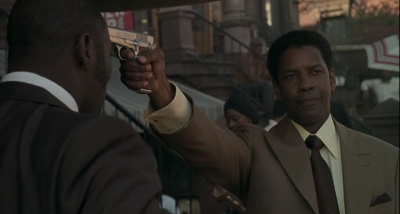 |
| [click on the thumbnail to enlarge] |
The movie is wonderfully cast and well-acted -- more than enough to wipe away the memory of Virtuosity, Crowe and Washington's last on-screen pairing as cop and killer -- but even though American Gangster does take pains to give both men an even keel, it still feels lopsided. I just didn't feel particularly engaged by the character of Richie Roberts. It's a lower-key performance that leans away from Crowe's usual intensity, and there's rarely any sign that Roberts is anything but hopelessly outmatched and outclassed by Lucas.
American Gangster is anchored by a compelling, if largely internalized, turn by Denzel Washington, drawing Frank Lucas as a man whose every action and mannerism is carefully and deliberately considered. Lucas keeps himself under the radar by avoiding being flashy or drawing unwanted attention to himself, and this is reflected in Washington's fairly subdued performance. His charm, charisma, and even a sort of nobility make it easy to forget that Lucas is responsible for the deaths of thousands, something American Gangster tries to address by intercutting graphic imagery of the misery he's wrought, and the quietness of his performance makes Lucas' anger seem that much more explosive when he does let loose.
2007 was a hell of a year for Josh Brolin, having carried much of No Country for Old Men on his shoulders and standing out as the most memorable thing about In the Valley of Elah, Grindhouse, and American Gangster. His turn as an untouchably corrupt cop here isn't exactly subtle, but it's an unflinching, untethered performance and easily my favorite in the movie.
Lucas and Roberts are kept at such a distance from the audience and each other that I wouldn't consider American Gangster to be a character piece any more than I would an action movie, and even having watched it several times by this point, there really isn't anything -- in terms of the characters, the story, or Ridley Scott's visual style -- for me to sink my teeth into. I have to admit that this leaves me feeling almost indifferent towards American Gangster. The movie consistently held my attention and doesn't make any gross missteps, but written, directed, and acted with perhaps too much restraint, it lacks the certain, indefinable something that'd make for a particularly engaging, memorable film. I do like American Gangster -- a well-acted slow burn through a familiar, reliable premise -- but I can't muster quite enough enthusiasm to say that it's an essential purchase.
This Blu-ray release includes both the
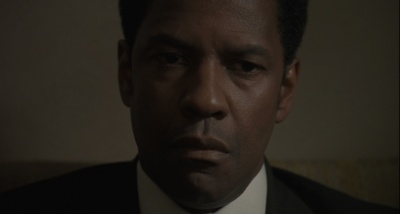 |
| [click on the thumbnail to enlarge] |
Video: When American Gangster was released on HD DVD, it too included both versions of the movie, but bafflingly, only the theatrical cut was presented in high definition. Universal has corrected that misstep on Blu-ray via seamless branching, allowing both versions of the film to be offered in 1080p.
Ridley Scott speaks at length in the disc's audio commentary about the very distinctive look he wanted to shape for American Gangster, and while it does look as if this Blu-ray disc maintains that intent, it's not a visual style that exactly dazzles in high definition. Clarity and fine detail impress somewhat in tighter shots, but the image is unusually soft and murky when the camera eases back. Much of the color has been drained away, leaving a palette that's gray, desaturated, and overcast. The flattened contrast and anemic black levels just result in the movie looking that much more limp and lifeless. Somewhat unexpectedly for a movie taking so many of its visual cues from the grim, gritty movies of the '70s, there's surprisingly little visible film grain, and I can't help but be suspicious that Universal's wiped away some of that texture as they have for several of their other recent Blu-ray releases. I'm sure American Gangster is at least a modest step up over the DVD, but I'm skeptical that it'd make for a particularly compelling upgrade, and viewers shouldn't go in expecting anything approaching reference quality.
American Gangster is lightly letterboxed to preserve its theatrical aspect ratio of 1.85:1, and both versions of the film have been compressed with the VC-1 codec.
Audio: Both versions of American Gangster boast an outstanding 24-bit DTS-HD Master Audio soundtrack. Even with little in the way of the usual action theatrics, the sound design uses all of the channels at its fingertips to render a rich, immersive atmosphere, from the hustle and bustle of the Big Apple to some smooth split surround effects as a helicopter soars overhead. The Frazier/Ali fight -- a key sequence in the film -- takes advantage as well, thanks to the deafening roar of the crowd and the relentless flashing of camera bulbs. The highlight, of course, is the climactic raid on Lucas' stronghold, which is brief but unflinchingly, devastatingly brutal and leaves a hell of an impression. The film's dialogue is rendered cleanly and clearly, although there were a few scattered spots where it seemed a touch low in the mix. The lower frequencies tend to be fairly restrained, but the cracks of gunfire and the rattling trains are bolstered by a decent amount of bass. While I'll admit to being underwhelmed by American Gangster's visuals in high definition, its lossless audio impresses by any reasonable standard.
The theatrical cut of American Gangster also includes a French track in Dolby Digital 5.1, although there are no dubs for the extended version of the movie. Both cuts of the film are accompanied by optional subtitle streams in English (SDH), French, and Spanish.
Extras: Exclusive to this Blu-ray release is another of Universal's U-Control features: this time, picture-in-picture video overlaying brief interviews and behind-the-scenes footage over the extended cut of the movie as it plays. This fly-on-the-wall footage from the shoot appears in quick, sparse spurts, though, and it's too infrequent to
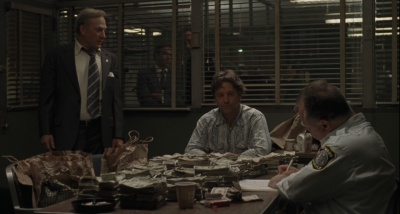 |
| [click on the thumbnail to enlarge] |
The theatrical version of American Gangster offers audio commentary by Ridley Scott and writer Steven Zaillian. The two of them were recorded separately and pieced together for this track, and the editing does ensure that there aren't any awkward gaps of silence throughout the movie's two and a half hour runtime. I'll admit that the commentary seemed awfully dry to me at first, but I eventually warmed to it, particularly when Scott started speaking more at length about the technical end of filmmaking. Scott is very much the dominant presence in this track, and some of the highlights include his descriptions of the logistics of managing a period piece on this sort of enormous scale, distinguishing between a "movie" and a "film", describing at length what he sought out to accomplish with the film visually, comparing and contrasting modern filmmaking technology and techniques with his earliest days as a director, and even ranting about the quality of first-rate cigars versus coffee and tea.
Zaillian naturally focuses more on his process as a screenwriter, including the evolution of many different drafts, the daunting density of a screenplay with 350 scenes, and how he pared down some 50 hours of interviews and tomes of research into a coherent script. The commentary also offers additional background into the real life events, such as further detailing exactly how Lucas established his heroin pipeline and how it was prepared for distribution as well as Roberts' all-but-non-existent reward for bringing such a notorious criminal to justice. The commentary is a bit of a slow burn at first, but it's worth a listen.
The centerpiece of the disc's extras is the feature-length "Fallen Empire: Making American Gangster" (78 min.), which can be viewed in its entirety or as six individual featurettes. "Fallen Empire" opens by delving in-depth into the real-life story that inspired American Gangster, continuing from there into the scale of the costume design and the influence the wardrobe had on the cast, the troubled history behind a project that twice before had the plug pulled on it, location scouting, casting celebrity cameos and filling an arena with some 1,500 inflatable extras for the Ali/Frazier bout, and the extensive work that went into the editing, sound design, and music of the film. Comprehensive and engaging, "Fallen Empire" is my favorite of the extras on this disc.
"Case Files" is a 25 minute set of
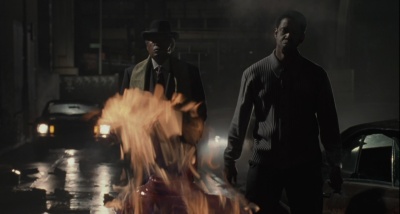 |
| [click on the thumbnail to enlarge] |
Most of the other extras are fairly bland, though. Two heavily promotional pieces -- one a bit of shameless corporate synergy from Dateline NBC, the other courtesy of BET -- mix a bit of backstory, lightweight interviews, and many clips from the movie. The BET special is the better of the two, featuring a more extensive selection of talent and touching on the film's soundtrack as well. These two promotional pieces clock in around 20 minutes each. The other featurette, "Hip Hop Infusion" (5 min.), highlights the number of rappers acting in American Gangster and notes that those sorts of performers tend to be at ease improvising in front of the camera.
There are two deleted scenes, including a very brief bit of gunplay that would've opened the movie as well as an unnecessary and rather uninteresting peek inside Lucas' wedding. These two short pieces of footage run right at four minutes in total. Rounding out the extras are two music videos -- a remix of Anthony Hamilton's "Do You Feel Me?" (f. Ghostface Killer) and Jay-Z's "Blue Magic" -- along with a theatrical trailer. None of the extras on this disc are presented in high definition.
Conclusion: With American Gangster, Ridley Scott aims for the dizzying heights of The Godfather but misfires. I like the movie, but its detached, subdued approach and determination to keep its central characters at arm's length from both each other and the audience feel like a missed opportunity. The film's deliberately low-key visual style doesn't impress in high definition either, although this Blu-ray disc does feature an excellent lossless soundtrack and a reasonably extensive set of extras. Recommended, but with reservations; American Gangster is worth seeing but falls considerably short of the expectations swirling around it.
|
| Popular Reviews |
| Sponsored Links |
|
|
| Sponsored Links |
|
|
| Release List | Reviews | Shop | Newsletter | Forum | DVD Giveaways | Blu-Ray | Advertise |
|
Copyright 2024 DVDTalk.com All Rights Reserved. Legal Info, Privacy Policy, Terms of Use,
Manage Preferences,
Your Privacy Choices | |||||||









